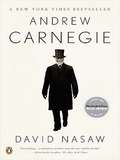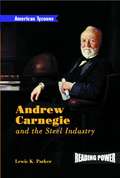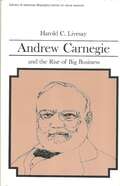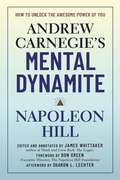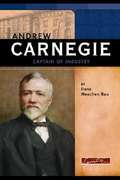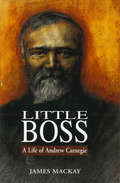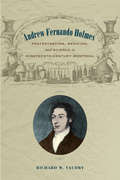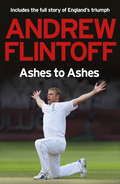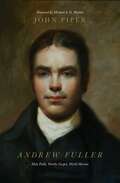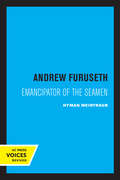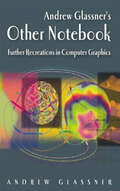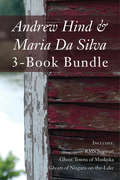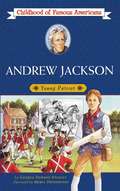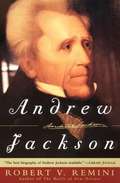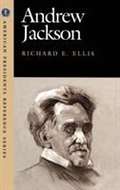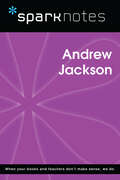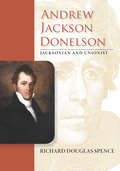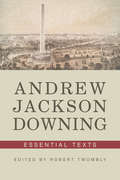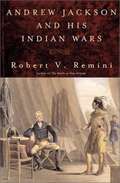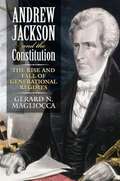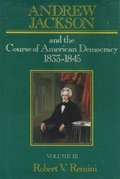- Table View
- List View
Andrew Carnegie
by David NasawCelebrated historian David Nasaw, whom The New York Times Book Review has called "a meticulous researcher and a cool analyst," brings new life to the story of one of America's most famous and successful businessmen and philanthropists--in what will prove to be the biography of the season. Born of modest origins in Scotland in 1835, Andrew Carnegie is best known as the founder of Carnegie Steel. His rags to riches story has never been told as dramatically and vividly as in Nasaw's new biography. Carnegie, the son of an impoverished linen weaver, moved to Pittsburgh at the age of thirteen. The embodiment of the American dream, he pulled himself up from bobbin boy in a cotton factory to become the richest man in the world. He spent the rest of his life giving away the fortune he had accumulated and crusading for international peace. For all that he accomplished and came to represent to the American public--a wildly successful businessman and capitalist, a self-educated writer, peace activist, philanthropist, man of letters, lover of culture, and unabashed enthusiast for American democracy and capitalism--Carnegie has remained, to this day, an enigma. Nasaw explains how Carnegie made his early fortune and what prompted him to give it all away, how he was drawn into the campaign first against American involvement in the Spanish-American War and then for international peace, and how he used his friendships with presidents and prime ministers to try to pull the world back from the brink of disaster. With a trove of new material--unpublished chapters of Carnegie's Autobiography; personal letters between Carnegie and his future wife, Louise, and other family members; his prenuptial agreement; diaries of family and close friends; his applications for citizenship; his extensive correspondence with Henry Clay Frick; and dozens of private letters to and from presidents Grant, Cleveland, McKinley, Roosevelt, and British prime ministers Gladstone and Balfour, as well as friends Herbert Spencer, Matthew Arnold, and Mark Twain--Nasaw brilliantly plumbs the core of this facinating and complex man, deftly placing his life in cultural and political context as only a master storyteller can.
Andrew Carnegie And The Steel Industry (American Tycoons Ser.)
by Lewis K. Parker<P>Steel is used to make bridges, cars, planes, skyscrapers, and much more. <P>Readers can learn how Andrew Carnegie helped to create a process that made steel easier to make, cheaper to buy, and one of the biggest industries in America.<P> Reluctant readers will be awe-struck as they learn how Carnegie worked his way from poverty to become the Steel King.
Andrew Carnegie and the Rise of Big Business
by Harold C. LivesayThe titles in the Library of American Biography Series make ideal supplements for American History Survey courses or other courses in American history where figures in history are explored. Paperback, brief, and inexpensive, each interpretative biography in this series focuses on a figure whose actions and ideas significantly influenced the course of American history and national life. At the same time, each biography relates the life of its subject to the broader themes and developments of the times.
Andrew Carnegie's Mental Dynamite: How to Unlock the Awesome Power of You
by Napoleon Hill James Whittaker Don GreenBased on a series of booklets written by bestselling motivational writer Napoleon Hill, Andrew Carnegie&’s Mental Dynamite outlines the importance of three essential principles of success: self-discipline, learning from defeat, and the Golden Rule applied. In 1908, Napoleon Hill met industrialist Andrew Carnegie for what he believed would be a short interview for an article. Instead, Carnegie spent hours detailing his principles of success to the young magazine reporter. He then challenged Hill to devote 20 years to collating a proven formula that would propel people of all backgrounds to happiness, harmony, and prosperity. Hill accepted the challenge, which he distilled in the perennial bestseller Think and Grow Rich. Now, more than a century later, the Napoleon Hill Foundation is releasing this epic conversation to remind people that there are simple solutions to the problems troubling us most, everything from relationships and education to homelessness and even democracy. This is revealed in three major principles: self-discipline, which shows how the six departments of the mind may be organized and directed to any end; learning from defeat, which describes how defeat can be made to yield &“the seed of an equivalent benefit&” and how to turn it into a stepping-stone to greater achievement; and the Golden Rule applied for developing rewarding relationships, peace of mind, and a strengthened consciousness. Each chapter draws on Carnegie&’s words and advice as inspiration, with annotations by Napoleon Hill scholar James Whittaker explaining why they are essential for reaching your goals and prospering—for you, your family, and your community.
Andrew Carnegie: Captain of Industry
by Dana Meachen RauThis book is a biography of Andrew Carnegie who came to the United States from Scotland as a boy and grew up to become a steel producer, a great philanthropist, and the wealthiest man in the world.
Andrew Carnegie: Little Boss
by Dr James MackayAndrew Carnegie (1835–1922) was a mass of contradictions: a radical Chartist who became a rabid capitalist, an idealist who was also a profound cynic, a committed pacifist who also played a crucial role in the opening part of the American Civil War, and a ladies’ man who had to wait until his fifties (after his domineering mother died) before forming a meaningful relationship with a woman. From bobbin boy in a Pittsburgh factory he progressed to messenger boy, telegraphist and railway superintendent. His meteoric rise owed much to his boss, Thomas Scott, who also cut the young Carnegie in on his first lucrative share deal. The youth who earned thirty-five dollars a month was on the road to his first million within a year or two, and he never looked back. Speculation in rolling-stock and railways, the nascent oil industry, iron and, above all, steel made Carnegie the richest man in the world. Along the way he created fortunes for many others, but trampled on friend and foe alike in his relentless pursuit of money. Then, the man who amassed the largest fortune in the world proceeded to give most of it away. From free libraries to world peace, the Carnegie millions were pumped into a host of worthy causes. The Peace Palace at the Hague is the lasting legacy of this global philanthropy; but Carnegie’s faith in the Kaiser to achieve world peace was shattered by the outbreak of the First World War, and it was a setback from which he never recovered. This candid and penetrating biography follows Carnegie from his humble birthplace in Dunfermline to the squalor of Allegheny City and Pittsburgh in the 1840s, and charts his dramatic rise to fame and fortune. Set against the contrasting backdrops of radical Scotland and America during the most turbulent phase of its development, Little Boss is the definitive story of one of the world’s greatest captains of industry.
Andrew Fernando Holmes: Protestantism, Medicine, and Science in Nineteenth-Century Montreal
by Richard VaudryThis is the first comprehensive study of the life and work of Andrew Fernando Holmes, famous for his work on congenital heart disease. Physician, surgeon, natural historian, educator, Protestant evangelical. Andrew Fernando Holmes’s name is synonymous with the McGill medical faculty and with the discovery of a congenital heart malformation known as the "Holmes heart." He also played a critical role in the creation of a scientific culture in early-nineteenth-century Montreal. Born in captivity at Cadiz, Spain, Holmes immigrated to Lower Canada in the first decade of the nineteenth century. He arrived in a province that was experiencing profound social, economic, and cultural change as the result of a long process of integration into the British Atlantic world. A transatlantic perspective, therefore, undergirds this biography, from an exploration of how Holmes’s family members were participants in an Atlantic world of trade and consumption, to explaining how his educational experiences at Edinburgh and Paris informed his approach to the practice of medicine, medical education, and medical politics.
Andrew Flintoff: One Test After Another
by Andrew Flintoff'Freddie' Flintoff is perhaps the best-known cricketer in the world, and definitely the most loved in the UK. Widely considered the greatest English all-rounder since Ian Botham, bars at cricket grounds immediately empty the moment he approaches the wicket. It was victory in the 2005 Ashes series that cemented Flintoff's place at the nation's heart, with his stunning performances helping ensure the Ashes were regained for the first time in eighteen years.
Andrew Flintoff: One Test After Another
by Andrew Flintoff'Freddie' Flintoff is perhaps the best-known cricketer in the world, and definitely the most loved in the UK. Widely considered the greatest English all-rounder since Ian Botham, bars at cricket grounds immediately empty the moment he approaches the wicket. It was victory in the 2005 Ashes series that cemented Flintoff's place at the nation's heart, with his stunning performances helping ensure the Ashes were regained for the first time in eighteen years.
Andrew Fuller: Holy Faith, Worthy Gospel, World Mission
by John Piper Michael A. G. HaykinAlthough he never went abroad, Andrew Fuller was a zealous promoter of world missions, influencing countless missionaries, such as William Carey, and championing the importance of sound doctrine for the perseverance and fruitfulness of world evangelism. In this short biography, John Piper puts Fuller’s movement-inspiring life and theology on display, calling all Christians to devote themselves to knowing, guarding, and spreading the true gospel—even to the very ends of the earth.
Andrew Furuseth: Emancipator of the Seamen
by Hyman WeintraubThis title is part of UC Press's Voices Revived program, which commemorates University of California Press’s mission to seek out and cultivate the brightest minds and give them voice, reach, and impact. Drawing on a backlist dating to 1893, Voices Revived makes high-quality, peer-reviewed scholarship accessible once again using print-on-demand technology. This title was originally published in 1959.
Andrew Glassner's Other Notebook: Further Recreations in Computer Graphics
by Andrew GlassnerHere, Andrew Glassner opens his notebook and invites readers into a wide range of stimulating explorations of art, nature and computer graphics. The text is accessible and informal, alongside images illustrating topics from Celtic knotwork and lightning to soap bubbles.
Andrew Hind and Maria Da Silva 3-Book Bundle: RMS Segwun / Ghost Towns of Muskoka / Ghosts of Niagara-on-the-Lake
by Andrew Hind Maria Da SilvaThree titles in Andrew Hind and Maria Da Silva’s acclaimed series on the local history, maritime colour, and even the shadowy side of Ontario’s most picturesque communities. From ghost towns to actual ghosts, the unexpected abounds in this collection of the most surprising corners of Ontario — a must for cottagers and local-history lovers, brought to you by two of the best! Includes: RMS Segwun Ghost Towns of Muskoka Ghosts of Niagara-on-the-Lake
Andrew Jackson
by Meryl Henderson George E. StanleyDear Reader: The Childhood of Famous Americans series, seventy years old in 2002, chronicles the early years of famous American men and women in an accessible manner. Each book is faithful in spirit to the values and experiences that influenced the person's development. History is fleshed out with fictionalized details, and conversations have been added to make the stories come alive to today's reader, but every reasonable effort has been made to make the stories consistent with the events, ethics, and character of their subjects. These books reaffirm the importance of our American heritage. We hope you learn to love the heroes and heroines who helped shape this great country. And by doing so, we hope you also develop a lasting love for the nation that gave them the opportunity to make their dreams come true. It will do the same for you. Happy Reading! The Editors
Andrew Jackson
by Meryl Henderson George E. StanleyDear Reader: The Childhood of Famous Americans series, seventy years old in 2002, chronicles the early years of famous American men and women in an accessible manner. Each book is faithful in spirit to the values and experiences that influenced the person's development. History is fleshed out with fictionalized details, and conversations have been added to make the stories come alive to today's reader, but every reasonable effort has been made to make the stories consistent with the events, ethics, and character of their subjects. These books reaffirm the importance of our American heritage. We hope you learn to love the heroes and heroines who helped shape this great country. And by doing so, we hope you also develop a lasting love for the nation that gave them the opportunity to make their dreams come true. It will do the same for you. Happy Reading! The Editors
Andrew Jackson
by Robert V. ReminiProfessor Remini, already a recognized authority on the Jacksonian period, has written the best biography of Andrew Jackson available. It summarizes adequately the best of the old scholarship while at the same time branching off to offer significant new interpretations of crucial points.
Andrew Jackson (American Presidents Reference Series)
by Richard E. EllisEach volume in the "American Presidents Reference Series" is organized around an individual presidency and gathers a host of biographical, analytical, and primary source historical material that will analyze the presidency and bring the president, his administration, and his times to life. The series focuses on key moments in U.S. political history as seen through the eyes of the most influential presidents to take the oath of office. Unique headnotes provide the context to data, tables and excerpted primary source documents. Andrew Jackson, born in 1767, attained the rank of major general. Through his military exploits during the war of 1812, Jackson was nicknamed 'Old Hickory'. His victory in the Battle of New Orleans helped launch his political career. Although Senator Jackson won the most electoral votes in the 1824 presidential election, the race was thrown in the House of Representatives where John Quincy Adams prevailed. Four years later he defeated Adams and became the seventh president of the United States. He was the first westerner to be elected by the common man and not the elite, and the first to be a target of a presidential assassin. With the turmoil of the times, Jackson was confronted with sectional politics, nullification threats, and the responsibility of removing Native Americans from their ancestral homes. Jackson died in 1845. This new volume on the Andrew Jackson presidency will cover: Economic development; The new Democratic Party; Native Americans; The Bank of the United States; Sectionalism; His military career; and, Personal scandal.
Andrew Jackson (SparkNotes Biography Guide)
by SparkNotesAndrew Jackson (SparkNotes Biography Guide) Making the reading experience fun! SparkNotes Biography Guides examine the lives of historical luminaries, from Alexander the Great to Virginia Woolf. Each biography guide includes: An examination of the historical context in which the person lived A summary of the person&’s life and achievements A glossary of important terms, people, and events An in-depth look at the key epochs in the person&’s career Study questions and essay topics A review test Suggestions for further reading Whether you&’re a student of history or just a student cramming for a history exam, SparkNotes Biography guides are a reliable, thorough, and readable resource.
Andrew Jackson Donelson: Jacksonian and Unionist (New Perspectives on Jacksonian America)
by Richard Douglas SpenceThis richly detailed biography of Andrew Jackson Donelson (1799-1871) sheds new light on the political and personal life of this nephew and namesake of Andrew Jackson. A scion of a pioneering Tennessee family, Donelson was a valued assistant and trusted confidant of the man who defined the Age of Jackson. One of those central but background figures of history, Donelson had a knack for being where important events were happening and knew many of the great figures of the age.As his uncle's secretary, he weathered Old Hickory's tumultuous presidency, including the notorious "Petticoat War." Building his own political career, he served as US chargé d'affaires to the Republic of Texas, where he struggled against an enigmatic President Sam Houston, British and French intrigues, and the threat of war by Mexico, to achieve annexation. As minister to Prussia, Donelson enjoyed a ringside seat to the revolutions of 1848 and the first attempts at German unification. A firm Unionist in the mold of his uncle, Donelson denounced the secessionists at the Nashville Convention of 1850. He attempted as editor of the Washington Union to reunite the Democratic party, and, when he failed, he was nominated as Millard Fillmore's vice-presidential running mate on the Know-Nothing party ticket in 1856. He lived to see the Civil War wreck the Union he loved, devastate his farms, and take the lives of two of his sons.
Andrew Jackson Donelson: Jacksonian and Unionist (New Perspectives on Jacksonian America)
by Richard Douglas SpenceThis richly detailed biography of Andrew Jackson Donelson (1799-1871) sheds new light on the political and personal life of this nephew and namesake of Andrew Jackson. A scion of a pioneering Tennessee family, Donelson was a valued assistant and trusted confidant of the man who defined the Age of Jackson. One of those central but background figures of history, Donelson had a knack for being where important events were happening and knew many of the great figures of the age. As his uncle's secretary, he weathered Old Hickory's tumultuous presidency, including the notorious "Petticoat War." Building his own political career, he served as US chargé d'affaires to the Republic of Texas, where he struggled against an enigmatic President Sam Houston, British and French intrigues, and the threat of war by Mexico, to achieve annexation. As minister to Prussia, Donelson enjoyed a ringside seat to the revolutions of 1848 and the first attempts at German unification. A firm Unionist in the mold of his uncle, Donelson denounced the secessionists at the Nashville Convention of 1850. He attempted as editor of the Washington Union to reunite the Democratic party, and, when he failed, he was nominated as Millard Fillmore's vice-presidential running mate on the Know-Nothing party ticket in 1856. He lived to see the Civil War wreck the Union he loved, devastate his farms, and take the lives of two of his sons.
Andrew Jackson Downing: Essential Texts
by Robert Twombly Andrew Jackson DowningA collection of essential writings by the father of landscape architecture and the urban park movement in the United States. Andrew Jackson Downing (1815-1852), a much-sought-after designer, influential writer, and editor of The Horticulturist, was an internationally known shaper of opinion. Robert Twombly has selected thirty-three essays on Architecture and Building, Landscape Gardening, Parks and Other Public Places, Village Beautification, Horticulture, and Agricultural Education, and provides an introduction to Downing's life and work and suggestions for further reading.
Andrew Jackson and His Indian Wars
by Robert V. ReminiExamination of why the 7th President of the US moved 5 Indian nations living in the South westward across the Mississippi River.
Andrew Jackson and the Constitution: The Rise and Fall of Generational Regimes
by Gerard MaglioccaOffering intriguing parallels between Jackson and George W. Bush regarding the scope of executive power, Magliocca has produced a rich synthesis of history, political science, and law that revives our understanding of an entire era and its controversies, while providing a model of constitutional law applicable to any period.
Andrew Jackson and the Course of American Democracy 1833-1845
by Robert V. ReminiVolume III of Robert V. Remini's biography of Andrew Jackson.<P><P> Winner of the National Book Award
Andrew Jackson and the Course of American Empire, 1767-1821
by Robert V. ReminiAndrew Jackson, born in Ireland, went to America and earned the people of America's respect and admiration for his valiant efforts to make America a great country. Even fifteen years after his death, people were willing to vote him as the President.
